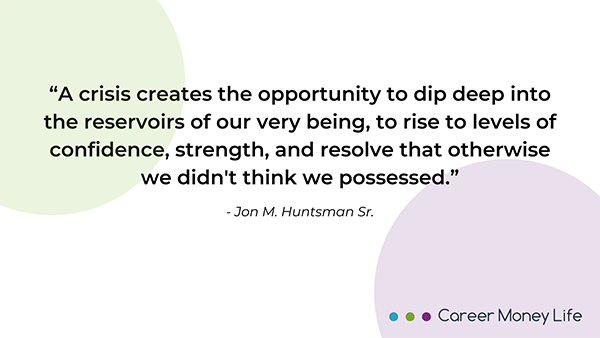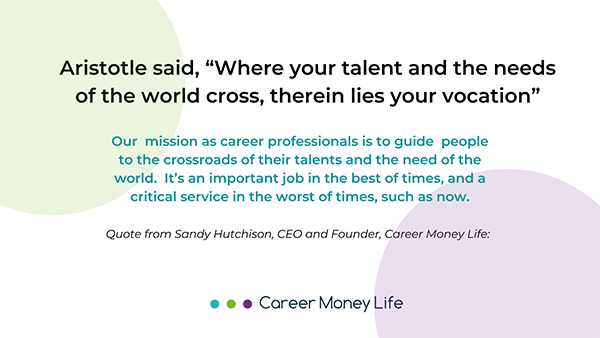Helping People Through Redundancy in a Crisis
09/03/2021
Career Money Life was the Victorian recipient for the 2020 CDAA Division Awards for Excellence in Practice. They are an innovative career development and transition platform and marketplace, offering employees and those leading their organisations advice, support, choice of services and providers and access to new career opportunities, all in one digital space. They manage the career transition process for Virgin Australia’s employees, working with them on an 800-person program before Covid hit. Before they knew it, Virgin was filing for bankruptcy and standing down over 8000 people. Anne Hutton and Raksha Yadalam from Career Money Life have written this blog post on helping people through redundancy in a crisis.

Facing redundancy and job loss is never an easy journey - coupled with a worldwide pandemic, the process and experience is all the more difficult. For most people, although it may seem like everything is going wrong, our role as a Career Coach is to remind them that: sometimes going through adversity during a crisis can really help bring out the best in them - experience facing and overcoming adversity could actually their biggest advantage.

During these difficult times, it is crucial for human resource teams and career practitioners to extend their support to employees that have been made redundant. Your regular approach to career development may need some alterations to keep pace with the new evolving climate.
Here are a few reminders of things do as a career practitioner to help people facing redundancy in a crisis:
1. ELIMINATE OR REDUCE UNCERTAINTY
One of the biggest sources of stress during times of change is uncertainty. Grappling with change in their professional and personal lives can make it difficult for them to see clearly and may leave them overwhelmed. It is important to try and make the future as certain as you can for them. This might include:
- Create a plan - Discuss the career goals and next steps with your clients and ensure you create a realistic and timely plan. This can help set them in motion and work towards achieving goals and milestones. Ensure they agree on some key actions, timelines and hold them to account.
- Financial advice - One of the biggest concerns with losing a job is also losing the financial security you had. Help ease their stress by leading them to the appropriate financial education resources or connect them to a qualified financial advisor. Understanding how to budget and cut costs is important during this time.
- Understanding their legal rights and government support - There are important things your client needs to ask if they are being made redundant. Make sure they are aware of their legal rights after redundancy to ensure that they received what they deserved from their past employer. Secondly, any extra support during this time will be really helpful, encourage them to look at any government support that they would be eligible for by guiding them to the right resources.
- Focus on the positives, but be realistic - When deep in the eye of the storm, people may not be able to look for sunshine - help them see the silver lining. Whatever they are feeling is totally reasonable, so don’t feel you have to talk them out of it, but gently remind them of the positives in the situation. This can include helping them find a “for now” job while they look for the “forever” job. This can help take the financial pressure off and give them back a sense of purpose and confidence. It may even turn into a forever job.
- Mental Health and Wellbeing - As a career coach you will be one of their key supporters during this difficult time. Let your clients know the importance of taking care of their mental health. Encourage them to access the EAP programs which are usually made available by their employer and urge them to seek help and talk to a professional (if needed.)
2. PREPARE THEM FOR THE FUTURE OF WORK
In the past, you would be doing your best to equip them with job search skills. Now, with the workforce changing, you need to not only help them look for jobs but also to be ready for the future of work.
- Upskilling and learning - The future of work is moving faster than ever, companies will now be looking at technology to take over more routine tasks and thus, the in-demand skills for most roles will change. The skills that your client may possess may not be enough. Help them understand the importance of upskilling as the types of skills needed in the labour market change rapidly.
- Other Pathways - For many people, finding a new job (in their current industry) may, in fact, not even be a consideration after a redundancy. A growing percentage of employees take redundancy as an opportunity to change careers entirely, take some time to de-stress or relax, or even start a new business on their own. Keep your clients informed of the various other pathways and avenues they could take to change, enhance or leave their current careers.
3. PROACTIVE JOB SEARCH TIPS
Many of your clients would have been out of the job search game for years. Suddenly they are now swimming in rough, choppy waters and will need you to be their guide. Help them proactively look for jobs and stay ahead of competition.
- Polish their personal brand - Help them optimise their Resume, LinkedIn profiles and the networking skills. Make sure to help them include the right buzzwords and have correct ATS formatting in place. For most, interviews can be very daunting, guide them on how they can best present themselves during interviews to land the roles that they are applying for.
- Transferable skills - We have a common phrase we like to use at Career Money Life, remind your clients that “It is not you that has been made redundant, it is your role.” Most employees do not realise the value of the skills they hold and how they can transfer these into careers in other industries. For example, our clients from Virgin Australia were in the airline industry, by understanding that they had leadership, communication and customer management skills enabled them transition into sales, hospitality and more customer facing roles.
- Networking - Most people do not even realise the value of their network. Harnessing the power of the hidden job market has led to many successful career changes. Encourage them to reach out to their networks and to also, step out and build more contacts.

Every individuals’ career transition journey is unique. You will be a critical part of this journey, ensure you take the time to appreciate the power of the work you do, it can and does change lives. The best way to help - is to help them clearly understand what they're looking for and then show them the best way possible to reach that goal. Traditional methods and solutions won’t work in the new dynamic market. Updating your service offering with new and innovative practices will help you and your clients achieve success.